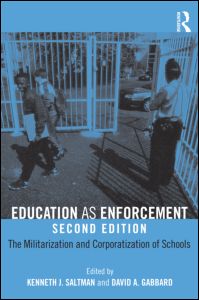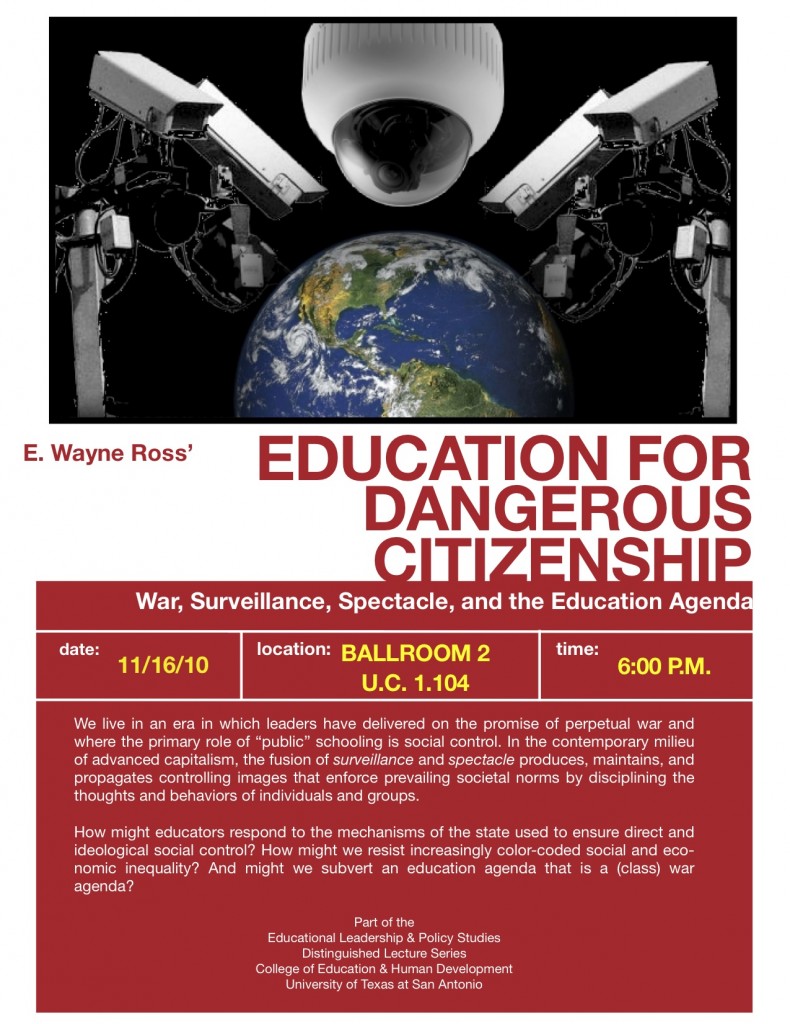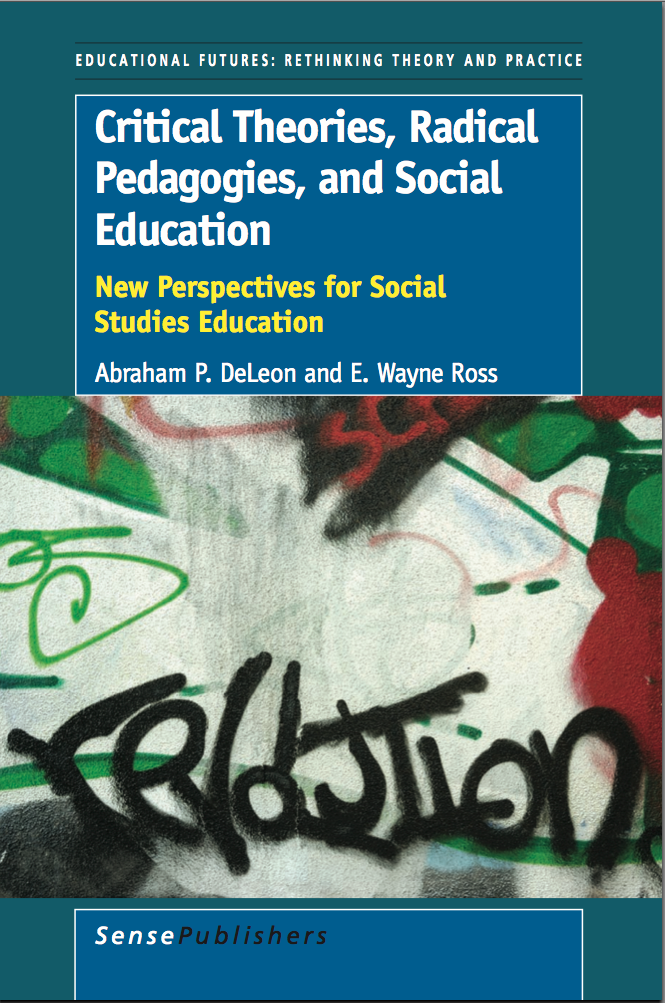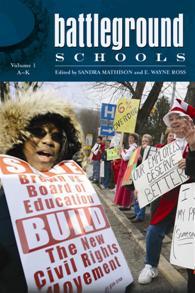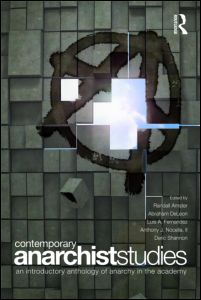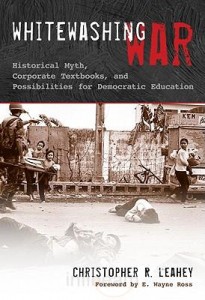CALL FOR CHAPTER PROPOSALS
FOR A BOOK ENTITLED
EDUCATING FOR PEACE IN A TIME OF PERMANENT WAR:
ARE SCHOOLS PART OF THE SOLUTION OR THE PROBLEM?
Under Contract
Routledge / Taylor & Francis
Co-editors Paul R. Carr (Lakehead University, Orillia) & Brad J. Porfilio (Lewis University)
Afterword Zvi Bekerman (Hebrew University)
SCHEDULE
1. Chapter proposals due: February 28, 2011
2. Feedback and decisions from editors to contributors: April 4, 2011
3. First drafts due to editors: July 15, 2011
4. Feedback on first drafts from editors to contributors: September 5, 2011
5. Final drafts by contributors due to editors: October 14, 2011
6. Manuscript to publisher: December 1, 2011
7. It is our expectation that the book will be publisher in early 2012
Statement of aims
This project responds to a defined need to add to the literature in a critical manner, providing scholars, educators and others interested in peace and peace education with a nuanced, complexifed analysis and, importantly, strategies to better understand how schools engage with the notion of war and peace, and, moreover, what they can do to become part of the solution related to creating societies that strive to establish peace as a foundational component to socio-cultural, economic and political manifestations framing relations and experiences.
This CALL FOR CHAPTER PROPOSALS seeks critical contributions from scholars who are concerned with the unchecked infiltration of the military within schools, whether it be through the curriculum, through pedagogy, through policy, through experiential learning, or through military recruitment. As Paulo Freire and other critical theorists, including Henry Giroux, Peter McLaren, bell hooks, Joe Kincheloe, Antonia Darder and others have acknowledged, education is a political process, and it should, necessarily, address human suffering and oppression. The willful neglect, combined with our individual and collective complicity within the military enterprise, sometimes referred to as the military-industrial complex, takes place at many levels, including ignorance of militarization at home and abroad, tacit support for military conflict in spite of alternatives for peace that exist, an uncritical reading of history that glorifies war and patriotism, a lack of critical engagement to promote peace over war, and a general reluctance to infuse a more critical pedagogical experience interwoven into education that would allow for deliberative democracy and engagement that seeks to contextualize and bring to life diverse epistemologies, value-sets, disciplines, theories, concepts, and experiences.
Little is done in schools at the formal and informal levels to address war and peace, especially in relation to what can and should be done to bring about peace, and this volume seeks to provide a range of policy, pedagogical, curriculum and institutional analyses aimed at facilitating meaningful engagement toward a more robust and critical examination of the role that schools play (and can play) in framing war, militarization and armed conflict.
We are particularly interested in the connection between war and peace. Many excellent texts deal specifically with peace and peace education, and we are hoping that this volume will make a more explicit connection between war/conflict/militarization and peace in and through education. We are also interested in nuanced, alternative, critical interdisciplinary studies that bring to light how we know, understand, engage with, and problematize war within our societies, and, particularly, within our schools. This manuscript is intended for an international audience, and we welcome proposals from scholars in diverse contexts, geographical locations and disciplines.
ONE LINE DESCIPTION OF THE BOOK
Ignorance is no defense, and may even be construed as complicity in the quest for what Peter McLaren calls “permanent war”.
If education is not about peace, then is it about war?
Can a society have education that willfully avoids considering peace as its central objective?
FOCUS
This book intends to better articulate how schools are part of the war industry, and, importantly, how schools can do peace education by examining war.
War is not a nebulous, far-away, mysterious venture; we are involved in perpetrating and perpetuating it, and education about and against war can be as liberating as it is necessary.
If war equates killing, can our schools avoid engaging in the examination of what war is all about?
This book shines a light on the pivotal role played by schools and education in ending or continuing war.
CALL FOR CHAPTER PROPOSALS
1. Submit the following by February 28, 2011, to Paul R. Carr and Brad J. Porfilio: prcarr@gmail.com & Porfilio16@aol.com
2.
a. Title of proposed chapter
b. Author(s) and complete institutional titles and contact information
c. A 150-word biography for each author
d. A 300-word abstract of the proposed chapter, including what research methods are being used, theoretical and conceptual framework used, focus, and findings (or expected findings), and how the chapter is directly connected to the focus of the book.
Co-editor biographies
Paul R. Carr is originally from Toronto, and now resides in Montreal. He was recently an associate professor at Youngstown State University, where he taught courses in multicultural education, the sociology of education, diversity and leadership, and qualitative methodology, and is now an Associate Professor at Lakehead University (Orillia) in the Departments of Sociology and Interdisciplinary Studies. His current research is broadly concerned with social justice, with specific threads related to critical pedagogy, democracy, media literacy, and intercultural education. In 2007, he co-edited The Great White North? Exploring Whiteness, Privilege and Identity in Education (Rotterdam: Sense Publishers), which won two national awards, and, in 2008, co-edited another book, entitled Doing Democracy: Striving for Political Literacy and Social Justice (New York: Peter Lang). He recently finalized two other edited books: the first in French entitled Les faces caches de l’intercultural (Paris: L’Harmattan), and the second, with Brad Porfilio, entitled Youth Culture, education and resistance: Subverting the commercial ordering of life (Rotterdam: Sense Publishers). He has recently authored book entitled Democracy and critical pedagogy: Does your vote count? (New York: Peter Lang). Paul is the co-founder and co-director of the Global Doing Democracy Research Project, which aims to produce a range of studies on the international level, leading to critical, comparative analysis of how democracy and education can be more effectively connected.
Dr. Brad J. Porfilio is Assistant Professor of Education at Lewis University in Romeoville, IL. He teaches courses on critical pedagogy, qualitative research, globalization and education, multicultural education, foundations of education, and curriculum theory in the Educational Leadership for Teaching and Learning Doctoral Program. The Educational Leadership Program at Lewis University is unique in its critical and transformative focus where students are prepared to become transformative educational leaders who are deeply discerning, knowledgeable and approach the educational system as a potential avenue for challenging and transforming the status quo. Dr. Porfilio received his PhD in Sociology of Education in 2005 at the University at Buffalo. During his doctoral studies, he served as an Assistant Professor of Education at Medaille College and D’Youville College, where he taught courses across the teacher education spectrum and supervised pre-service and in-service teachers from Canada and the US. He has published numerous peer-reviewed articles, book chapters, edited volumes, and conference papers on the topics of urban education, critical social studies education, neoliberalism and schooling, transformative education, teacher education, gender and technology, and cultural studies. He recently published three co- edited volumes: The first, co-edited with Curry Malott, The Destructive Path of Neoliberalism (Rotterdam: Sense Publishers), the second, co-edited with Paul R. Carr, Youth Culture, Education and Resistance: Subverting the Commercial Ordering of Life (Rotterdam: Sense Publishers), and the third, co-edited with Curry Malott, Critical Pedagogy in the 21st Century: A New Generation of Scholars (Charlotte, NC: Information Age Publishing).
Paul R. Carr Brad J. Porfilio
Lakehead University (Orillia) Lewis University
prcarr@gmail.edu porfilio16@aol.com
 Follow
Follow


